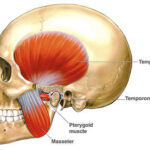 Researchers in the US and Spain observed benefits after a single session.
Researchers in the US and Spain observed benefits after a single session.
First, the details.
- 11 adults with chronic tension-type headache received both treatments in random order — crossover study.
- Head-neck massage
- Placebo intervention (detuned ultrasound)
- The immediate effects on heart rate variability, mood states, and pressure pain thresholds over both temporalis muscles (see drawing) were recorded.
- Profile of Mood States questionnaire (tension-anxiety, depression-dejection, anger-hostility, vigor, fatigue, confusion) was obtained before, and immediately and 24 hours after treatment.
- Patient-reported head pain was also recorded.
And, the results.
- After massage, patients showed a significant increase in heart rate variability vs no change with placebo.
- There were significant improvements in tension-anxiety and anger-hostility with massage vs no change with placebo.
- No significant changes were found in pressure pain thresholds.
- No influence of gender was found.
- Head pain was decreased significantly 24 hours after massage but not after placebo.
The bottom line?
The authors concluded, “A single session of manual therapy program produces an immediate… decrease in tension, anger status, and perceived pain in patients with chronic tension-type headache.”
It’s a small study, but most interesting is that the reduction in head pain continued 24 hours after massage. Unfortunately the abstract doesn’t list the percentage of patients who enjoyed 24 hours of pain relief.
Tension-type headache is the most prevalent headache type. It causes a high degree of disability and is difficult to treat.
In their review, the European Federation of Neurological Societies (EFNS) concluded, “Non-drug management should always be considered although the scientific basis is limited.” Physical therapy (this should include massage) and acupuncture are recommended by EFNS as potentially valuable options for patients with frequent tension-type headache. Although, they caution, “There is no robust scientific evidence for efficacy.”
This study helps fill the evidence gap for massage as a manual therapy option.
7/9/10 16:57 JR